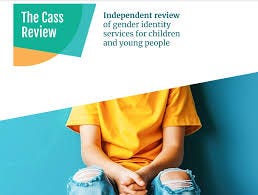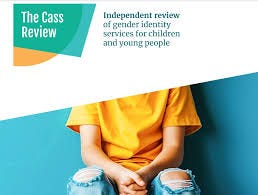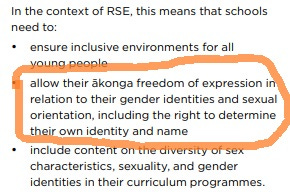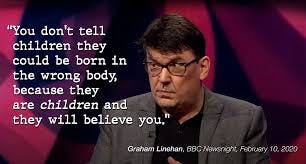Last week, the long-awaited Cass Independent Review of gender identity services for children and young people was released in the UK. It unequivocally demolishes the core beliefs of transgender ideology, and ought to have far-reaching implications, both in health care and in education.
This substack quotes extensively from the Cass Review to assist parents and educators when they write to MPs, principals, or BOTs to easily find the evidence they need in support of their demands for an urgent change in NZ education policies.
The Review’s chairperson, eminent paediatrician, Dr Hilary Cass, urged schools to apply its findings:
The importance of what happens in school cannot be under-estimated; this applies to all aspects of children’s health and wellbeing. Schools have been grappling with how they should respond when a pupil says that they want to socially transition in the school setting. For this reason, it is important that school guidance is able to utilise some of the principles and evidence from the Review. (p158)
Core transgender beliefs debunked
The Cass Review took four years to complete and included a specially-commissioned systematic review of international evidence, carried out by the University of York. Some of its damning conclusions are:
Puberty blockers are not provably effective, safe, or reversible.
Increased transgender ideation, particularly in teenage girls, is not simply a matter of trans identities becoming more widely accepted.
Immediate affirmation of a new gender identity is not evidence-based best practice.
Social transition does not reliably alleviate gender distress.
Suicide amongst gender-distressed adolescents is not more common than suicide for other mental health conditions.
Parents should not be routinely shut out of important decisions in their child’s life.
These solid findings make it all the more imperative that the coalition government acts immediately on its promise to remove gender ideology from Relationships and Sexuality Education (RSE) in NZ schools.
Puberty blockers
The Cass Review found there was no proven benefit and too many unanswered questions for the safe use of puberty blockers.
The University of York’s systematic reviews demonstrated poor study design, inadequate follow-up periods and a lack of objectivity in reporting of results. As a result, the evidence for the indicated uses of puberty blockers and masculinising/feminising hormones in adolescents are unproven and benefits/harms are unknown. (p194)
Earlier, this Report set out the very complex events that take place in the adolescent brain during puberty. Neuroscientists believe that these changes are driven by a combination of chronological age and sex hormones. Blocking the release of these sex hormones could have a range of unintended and as yet unidentified consequences. (p178)
The RSE Guide (Y1-8, p28), that teaches children about puberty blockers and thereby encourages their use, should be promptly withdrawn from use in all schools.
Transgender ideation
Cass devotes two chapters of the Report to consideration of various explanations for the exponential growth in young people claiming a transgender identity. (Chapters 7 & 8)
Since biological factors have not changed in the last 10 years it is necessary to look at other possible reasons for the increase in referrals and the disproportionate representation of birth-registered females. (p117)
The Review examines the effects of world events on the mental health of children born after 1995 and the unprecedented online access and social media interactions that generation has grown up with. The speed at which transgender beliefs have taken hold in that cohort is noted.
A common explanation put forward is that the increase in presentation is because of greater acceptance. While it certainly seems to be the case that there is much greater acceptance of trans identities, particularly among younger generations, which may account for some of the increase in numbers, the exponential change in referrals over a particularly short five-year timeframe is very much faster than would be expected for normal evolution of acceptance of a minority group. This also does not adequately explain the switch from birth-registered males to birth-registered females, which is unlike trans presentations in any prior historical period. (p26)
In Chapter 8, possible psychosocial factors influencing transgender ideation are considered, such as societal acceptance, changes in concepts of gender and sexuality, broader mental health challenges, peer and socio-cultural influences, and the availability of puberty blockers. (p117) Cass also notes the influence of peer pressure on transgender ideation:
Peer influence during this stage of life is very powerful. As well as the influence of social media, the Review has heard accounts of female students forming intense friendships with other gender-questioning or transgender students at school, and then identifying as trans themselves. (p122)
In conclusion, the Review recommends that gender-distressed children should be treated in the same way as children with other mental health concerns. RGE calls on the government to heed this advice.
The striking increase in young people presenting with gender incongruence/dysphoria needs to be considered within the context of poor mental health and emotional distress amongst the broader adolescent population, particularly given their high rates of co-existing mental health problems and neurodiversity. (p110)
Affirmation
Taking all these factors into consideration, Cass does not recommend immediate affirmation of a child in a new gender identity, instead the Review advises caution:
The qualitative study found that “For some, initial gender questioning created a sense of urgency, much of which focused on accessing medical pathways. These young adults acknowledged that their original response was to “fix” the problem. This became less important to them as they grew older. Some explained that discovering different ways to express gender identity was one of the most important things they had learned. They wished this had been explained to them when younger but remain uncertain about the extent they would have listened to such advice.” (p148)
Dr Cass states in the Foreword that there is “remarkably weak evidence” for the benefits of interventions to manage gender related distress and that clinicians “are unable to determine with any certainty which children and young people will go on to have an enduring trans identity.” (p22)
When discussing social transition (Chapter 12), Cass reports that
Given the weakness of the research in this area there remain many unknowns about the impact of social transition. In particular, it is unclear whether it alters the trajectory of gender development, and what short- and longer-term impact this may have on mental health. (p163)
At odds with this finding, the current advice to schools from the Ministry of Education treats ‘gender identity’ as a factual and stable state that schools must allow. (RSE Guide Y1-8, p8)
As the long-term impact of affirming a ‘gender identity’ at school is unknown, the above advice must be retracted by the Minister of Education.
Social transition
The Cass Review is clear in its conclusion that full social transition* is not justified by the evidence. (*Changing appearance, names and pronouns to align with stereotypes of the opposite sex, or no sex.)
The information above demonstrates that there is no clear evidence that social transition in childhood has positive or negative mental health outcomes. There is relatively weak evidence for any effect in adolescence. However, sex of rearing* seems to have some influence on eventual gender outcome, and it is possible that social transition in childhood may change the trajectory of gender identity development for children with early gender incongruence. (p164)
*Sex of rearing refers to studies of children with DSD that suggest the sex they were reared as has played a part in their adult gender identity. (p102)
Cass recommends a “more cautious approach”, with “clinical involvement in the decision-making process”, and that decisions about social transition should not be undertaken by teaching staff. (p164)
“This is not a role that can be taken by staff without appropriate clinical training.”
The Report warns against full social transition at an early age.
We do not know the ‘sweet spot’ when someone becomes settled in their sense of self, nor which people are most likely to benefit from medical transition. When making life-changing decisions, what is the correct balance between keeping options as flexible and open as possible as you move into adulthood, and responding to how you feel right now? (Foreword)
The clinician should help families to recognise normal developmental variation in gender role behaviour and expression. Avoiding premature decisions and considering partial rather than full transitioning can be a way of ensuring flexibility and keeping options open until the developmental trajectory becomes clear. (p32)
It also warns against “stealth” transition, where a child has socially transitioned in secret, with peers and teachers unaware of the change.
… some children living in stealth have a common, genuine fear of “being found out”… They observed that this fear of “being found out” is driving a sense of urgency to access puberty blockers, which may not allow consideration of other pros and cons of the treatment.
… living in stealth appears to increase a child’s level of stress and anxiety with resultant behaviour and mental health problems. These included social withdrawal, with children becoming increasingly isolated, including resorting to home-schooling or tutoring and even rarely leaving their house. (p159)
Instead of rushing to affirm social transition, the Review says parents and families should be helped to “ensure that options remain open and flexible for the child, whilst ensuring that the child is able to function well in school and socially …” (p41)
Unfortunately, in a gross breach of trust, many schools have inappropriately intruded in the parent/child relationship.
However, the Review heard concerns from many parents about their child being socially transitioned and affirmed in their expressed gender without parental involvement. This was predominantly where an adolescent had “come out” at school but expressed concern about how their parents might react. (p160)
“This set up an adversarial position between parent and child where some parents felt “forced” to affirm their child’s assumed identity or risk being painted as transphobic and/or unsupportive.”
Suicide
The claims of increased risk of suicide in gender-distressed children – often the justification for early social transition or medication – are not borne out by the evidence.
As discussed in Part 3, it is well established that children and young people with gender dysphoria are at increased risk of suicide, but suicide risk appears to be comparable to other young people with a similar range of mental health and psychosocial challenges. Some clinicians feel under pressure to support a medical pathway based on widespread reporting that gender-affirming treatment reduces suicide risk. This conclusion was not supported by the above systematic review (p186)
School policies that use faulty claims of suicide risk as justification for unquestioning social transition must be withdrawn.
The importance of parents
The right of parents to be involved in life-changing decisions about their children is strongly upheld by the Cass review.
Outcomes for children and adolescents are best if they are in a supportive relationship with their family. For this reason parents should be actively involved in decision making unless there are strong grounds to believe that this may put the child or young person at risk. (P164)
In direct contradiction to this advice, is the secrecy recommended by InsideOUT in its government-funded resource Making Schools Safer.
The tag of “trusted organisation” needs to be immediately withdrawn from InsideOUT and any other organisations that advocate for teachers or schools to collude in keeping secrets from parents.
Ministerial instructions
In our Briefing Document to the new Minister of Education in December 2023, RGE asked her to instruct schools to immediately cease the practice of secret transitioning, the use of wrong sex pronouns, and trans activist lobby groups, without appropriate qualifications, being invited to address students.
The findings of the Cass Review corroborate all of these requests and RGE has written again to urge the Minister to immediately withdraw the RSE Guide and stop the school to radical medical intervention pipeline that it has created in vulnerable youth.
As reported by Cass:
Clinicians who have spent many years working in gender clinics have drawn very different conclusions from their clinical experience about the best way to support young people with gender-related distress. Some feel strongly that a majority of those presenting to gender services will go on to have a long-term trans identity and should be supported to access a medical pathway at an early stage. Others feel that we are medicalising children and young people whose multiple other difficulties are manifesting through gender confusion and gender-related distress. (Foreword)
When specialist medical professionals cannot agree on the best practice for these children, there should be no opportunity for teachers or schools to invent their own practices that may prematurely cement a transgender identity.
Additionally, RGE is in agreement with this analysis of Dr Cass’ report provided by Sex Matters:
We are glad to see her say that social transition will rarely be in a child’s interests, and particularly for a primary-aged child, and that it should almost never happen without parental consent. But she doesn’t take the final necessary step and register that it is simply not ethical or safe for a school to treat any child as having changed sex. It is impossible to keep either the trans-identified child or their classmates safe if the adults responsible for their safety aren’t completely clear at all times about the sex of all the children they are caring for.
The Minister of Education must instruct principals and BOTs to read the Cass Review and adjust their policies to align with the recommendations it contains.
Further information about the Cass Review that may be useful for letter-writing is contained in this editorial from the British Medical Journal and this post from Speak up for Women.









Many thanks for all this work. It is succint and is useful to a range of people who work with and truly care for young people.
Excellent précis. It will be helpful, for example, for parents to know that trans ideation is a mental health condition which does not carry a higher suicide risk than other mental health conditions in young people. I cannot say enough how shameful it has been for health professionals to have put the ‘suicide risk’ burden on parents of trans ideating kids, whether or not they thought they were acting appropriately at the time. There is no excuse for a lack of critical thinking for health professionals.